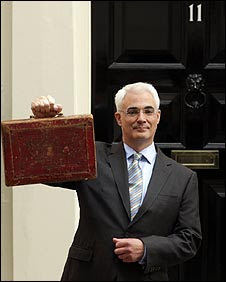Facing with all the pressures of the current economic crisis,it says that the government played
two all-too-political sleights of hand: a string of over-optimistic economic assumptions and the misleading message that soaking the rich could absolve the other 98% of the population from personal sacrifice.
It continues by describing the fiscal plans as
like one of those childish excuses that begin with a little exaggeration and morph into outright falsehood.and as for the top rate of tax
The second fiction is that squeezing the rich can absolve the rank and file from privationand concludes that
April offered Mr Brown two shots at reviving his flagging premiership. The G20 went well. But by attempting to use the budget for political advantage rather than engaging the nation honestly in a slow, shared transformation, the prime minister has done neither himself nor his country any favours. The public is losing patience with him, and so is this newspaper.
